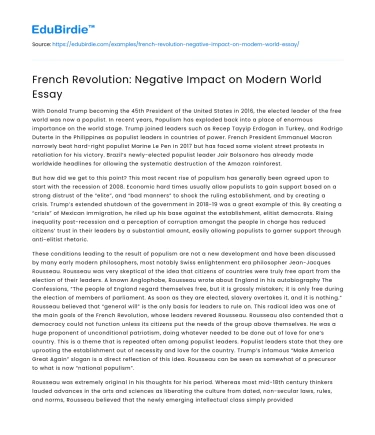With Donald Trump becoming the 45th President of the United States in 2016, the elected leader of the free world was now a populist. In recent years, Populism has exploded back into a place of enormous importance on the world stage. Trump joined leaders such as Recep Tayyip Erdogan in Turkey, and Rodrigo Duterte in the Philippines as populist leaders in countries of power. French President Emmanuel Macron narrowly beat hard-right populist Marine Le Pen in 2017 but has faced some violent street protests in retaliation for his victory. Brazil’s newly-elected populist leader Jair Bolsonaro has already made worldwide headlines for allowing the systematic destruction of the Amazon rainforest.
But how did we get to this point? This most recent rise of populism has generally been agreed upon to start with the recession of 2008. Economic hard times usually allow populists to gain support based on a strong distrust of the “elite”, and “bad manners” to shock the ruling establishment, and by creating a crisis. Trump’s extended shutdown of the government in 2018-19 was a great example of this. By creating a “crisis” of Mexican immigration, he riled up his base against the establishment, elitist democrats. Rising inequality post-recession and a perception of corruption amongst the people in charge has reduced citizens’ trust in their leaders by a substantial amount, easily allowing populists to garner support through anti-elitist rhetoric.
Save your time!
We can take care of your essay
- Proper editing and formatting
- Free revision, title page, and bibliography
- Flexible prices and money-back guarantee
These conditions leading to the result of populism are not a new development and have been discussed by many early modern philosophers, most notably Swiss enlightenment era philosopher Jean-Jacques Rousseau. Rousseau was very skeptical of the idea that citizens of countries were truly free apart from the election of their leaders. A known Anglophobe, Rousseau wrote about England in his autobiography The Confessions, “The people of England regard themselves free, but it is grossly mistaken; it is only free during the election of members of parliament. As soon as they are elected, slavery overtakes it, and it is nothing.” Rousseau believed that “general will” is the only basis for leaders to rule on. This radical idea was one of the main goals of the French Revolution, whose leaders revered Rousseau. Rousseau also contended that a democracy could not function unless its citizens put the needs of the group above themselves. He was a huge proponent of unconditional patriotism, doing whatever needed to be done out of love for one’s country. This is a theme that is repeated often among populist leaders. Populist leaders state that they are uprooting the establishment out of necessity and love for the country. Trump’s infamous “Make America Great Again” slogan is a direct reflection of this idea. Rousseau can be seen as somewhat of a precursor to what is now “national populism”.
Rousseau was extremely original in his thoughts for his period. Whereas most mid-18th century thinkers lauded advances in the arts and sciences as liberating the culture from dated, non-secular laws, rules, and norms, Rousseau believed that the newly emerging intellectual class simply provided cover for the powerful and corrupt. This anti-elitism is a huge part of populism and part of what makes it so appealing to the lower class. Materialistic values of the bourgeois would only hurt advances in equality and freedom. His famous term “amour propre” referred to a society where people are only interested in materialistic items to compare one another, and are consumed by self-interest. So far, I would say that this theoretical society is slowly becoming a reality. Brand new advances such as social media actively encourage comparisons based on the exterior image.
Rousseau moralized against the rich, intellectual class throughout the 20-plus books he wrote in his lifetime. He grew up unsupervised, from a struggling family, and was entirely self-taught. This is a stark contrast compared to the “establishment” philosophers of the time who generally were extremely well-educated and from wealthy backgrounds. Because of his lack of status, Rousseau found success among people adjusting to this new world that was switching from an agrarian society to a more urbanized one. New technologies being developed so quickly uprooted the traditional lifestyles of European citizens during the latter stages of the Enlightenment, and these people gravitated towards Rousseau’s distrust of the wealthy and powerful. By claiming that because the wealthy’s materialistic values were inherently corrupt, Rousseau managed to create his sort of political thought, one that would eventually be a driving force behind the French Revolution some 20 years after his death.
Rousseau’s ideas and themes in his writing provided the foundation for what populism is today. Similar to Rousseau, Trump found strong support in the citizens whose traditional values are being disrupted by enormous advances in technology and the sciences. New ideas such as big data and having everything one does online be tracked are frankly terrifying, and it is very easy to see why the public could latch on to populist ideals. Social media has become a den for “amour propre”, where comparisons of one another are centered around surface-level, exterior, materialistic values. Similar to France at the end of the 18th century, inequality is enormous and there is a strong distrust of not only politicians but of the wealthy elite in general. Rousseau’s commentary about the inevitability of populism in a society such as ours has held up even after 250 years have passed, with the themes and fears of populism remaining largely the same.






 Stuck on your essay?
Stuck on your essay?

